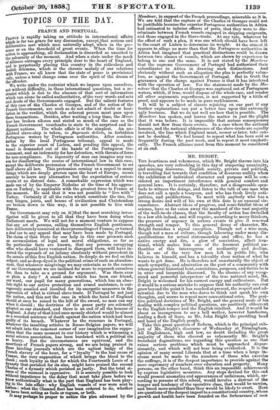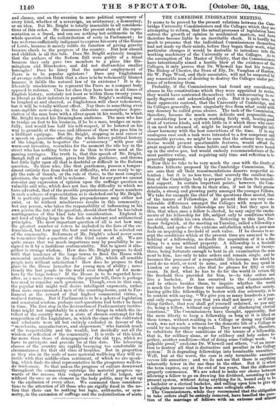MR. BRIGHT.
THE heartiness and vehemence, which Mr. Bright throws into his speeches, are very refreshing in this day of simpering unanimity, and mincing discourse. English society, private and political, is travelling fast towards that condition of decorous nullity when the exhibition of individual character and purpose will be con- sidered an impertinent interference with general comfort and general laws. It is certainly, therefore, not a disagreeable speo- tacle to witness the doings, and listen to the talk of one man who does not call a spade a teaspoon, and who has fresh lively anti- pathies, and predilections. To meet with anybody who has a strong desire and will of his own at this date is an unusual cir- cumstance. Abstract ideas of progress, and semi-fatalist ideas of science, have so far eaten away the manhood of the vast majority of the well-to-do classes, that the faculty of action has dwindled to a low ebb indeed, and will require, according to many thinkers, the pressure of urgency in serious events to give it renewed strength and temper. To this general decay of character, Mr. Bright furnishes a signal exception. Though not a wise man, though not a man of culture, though labouring under many dis- qualifications for actual statesmanship and office, he has a native energy and fire, a glow of conviction, albeit irra- tional, which makes him one of the foremost political au- thorities of this interregnum of mediocrity and decline. He is one of the very few men left in public life, who believes in himself, and has a tolerably clear notion of what he wants to get done. He is therefore not unnaturally the object of much sympathy, and admiration on the part of a community with whose general historical bent, convictions, purposes, and duties he is in utter and incurable disaccord. In the absence of any recog- nized and powerful interpreters of the true national mind, Bright is welcomed for his earnest energy and enthusiasm. But it would be a serious mistake to suppose that his authority can ever growbeyond the point it has reached at present, the respect and ad- miration due to the man who dares to think and speak his own thoughts, and scorns to repeat mere conventional cries. The posi- tive political doctrines of Mr. Bright, and the general mode of his dealing with complex political questions, are positively abhorrent to the English temper and the English intellect. And it would be about as incongruous to see a bell wether, however .handsome, leading a flock of lions, as Mr. John Bright the presiding head and hand of the English people.
Take this great question of Reform, which is the principal sub- ject of Mr. Blight's discourse of Wednesday at Birmingham. All Englishmen, high and low, no doubt including the great majority of those who cheered so vehemently Mr. Bright's trenchant dogmatisms, are regarding this question as one that raises serious problems which must be approached dispas- sionately, and which will not bear being overlooked. It is the opinion of many sound Liberals that at a time when a large in- crease must be made to the numbers of those who exercise the suffrage, it is of the deepest importance to provide against the mere supremacy of numbers over education and property. Many persons, on the other hand, think this an impossible achievement by express legislative measures. Any steps devised for this end would present anomalies and appearances of unfairness, which, ac- cording to persons of this school, would involve a distrust of the temper and tendency of the operative class, that would be unwise, and breed more mischief than they would be likely to avert. Here are questions of the deepest import to a constitutional country, Whose growth and health have been founded on the forbearance of men
and classes, and on the aversion to mere political supremacy of every kind, whether of a sovereign, an aristocracy, a democracy, or an idea. But Mr. Bright is totally insensible to all considera- tions of this order. He denounces the present state of the repre- sentation as a fraud, and can see nothing but arithmetic in the whole question of the redistribution of seats in Parliament ; he has no terms sufficiently indignant to express his scorn of the House of Lords, because it merely fulfils its function of giving gravity because check to the progress of the country. But how absurd and childish is all this talk. Does Mr. Bright seriously imagine that the authors of the Reform Bill were guilty of a fraud because they only gave two members to a place like Bir- mingham and Manchester, and did not disfranchise smaller boroughs ? Does he fancy that the natural employment of Peers is to be popular agitators ? Does any Englishman of average reflection think that a class is to be vehemently blamed because it fulfils the natural law of its existence ? It is de- liberately mischievous to represent the Peers as a compact body opposed to reforms. Class for class they have been in all times of English history, certainly not least so within these twenty years, as liberal as their inferiors in position. Mr. Bright's scolding may be laughed at and cheered, as Englishmen will cheer vehemence, but it will be totally without effect. Nay there is something even contemptible now-a-days in the elaborate commonplace depre- ciation of the man born with a silver spoon in his mouth, to which Mr. Bright treated his Birmingham audience. The man who has to trudge on foot to his business, if he be a man, trudges on man- fully, and would lose half his self-respect, if he loitered on his way to grumble at the ease and idleness of those who pass him in a brilliant equipage. But Mr. Bright, stopping in mill career of a speech on questions affecting the whole future political history of the kingdom, to bespatter the " aristocracy " with poor old worn-out invective, resembles for the moment the idle boy in the street who has nothing better to do than to throw mud at the passing carriages. The truth is, that this speech of Mr. Bright, though full of animation, gives but little guidance, and throws but little light upon all that is doubtful or difficult in the Reform question. To those who, like that gentleman, possess a temper- ament entirely free from doubt or difficulty, who are ready to ap- ply the rule of thumb, or the rule of three, to the most complex questions, the speech will be welcome. But for our part we cannot consider any expression of opinion upon the suffrage question as valuable and wise, which does not face the difficulty to which we have adverted, that of the possible preponderance of mere numbers in such a scheme of representation as is sketched out by Mr. Bright. It is perfectly possible that this preponderance may either not exist, or be without mischievous results in this community ; but any person, who takes the responsibility of influencing in his own person the fate of the question, should show that he has taken contingencies of this kind into his consideration. England is not fond of taking leaps in the dark on abstract and arithmetical principles. The most important question of all is not how may the greatest number of voters be included in the lists of the en- franchised, but how may the best and wisest men be selected out of the community. Reformers of Mr. Bright's school never seem to remember that a question of this kind exists at all. We pare quite aware that too much importance may by possibility be as- signed to it by a fastidious sentimentality. But to ignore it alto- gether is strange wisdom. How does Mr. Bright propose to deal with that tendency of the large towns to flood the House with successful merchants in the decline of life, which all sensible people note without satisfaction ? How does he propose to find place in the House hereafter for young men of ability ; noto- riously the last people in the world ever thought of for mem- bers by the large towns ? If the House is to be regarded here- after, as a mere force expressing the popular will, there is perhaps less need to consider such questions. Though, even in that case, the popular will might well desire intelligent exponents, rathei than mere superannuated men of the counting-house, sent to Par- liament as the reward of that highest commercial virtue, a realized fortune. But if Parliament is to be a sphere of legislation and senatorial wisdom, perhaps such questions had better be faced in time. The first step in the destruction of Parliamentary institu- tions might not improbably be a state of things in which the in- tellect of the country was in a state of chronic contempt for the composition of the Legislature, in which the class of the cultivated and scholastic were all but entirely excluded in favour of the "merchants, manufacturers, and shipowners" who furnish much of the respectability and the wealth, but decidedly not all the wisdom or reflection of the community. It is evils of this kind, far more than those of demagoguism of the old type, which we have to anticipate and provide for at this date. The labouring classes of the country are rapidly becoming too comfortable in circumstances for that old class of troubles. But in proportion Its they rise in the scale of mere material wellbeing they will co- in. cide with that middle-class sentiment, of which we are speak- ing, which finds its ideal representative in the prosperous well-to- do tradesman. So that unless the progress of culture downward throughout the community outstrips the material progress up- wards of the masses, this vulgar standard of the ledger, not without its uses as an element in the body politic, may be set up to the exclusion of every other. We commend these considera- tions to the attention of all those who are rigidly fixed in the no- tion that there can be nothing but logic, arithmetic, or sym- metry, in the extension of suffrage and the redistribution of seats.



























 Previous page
Previous page